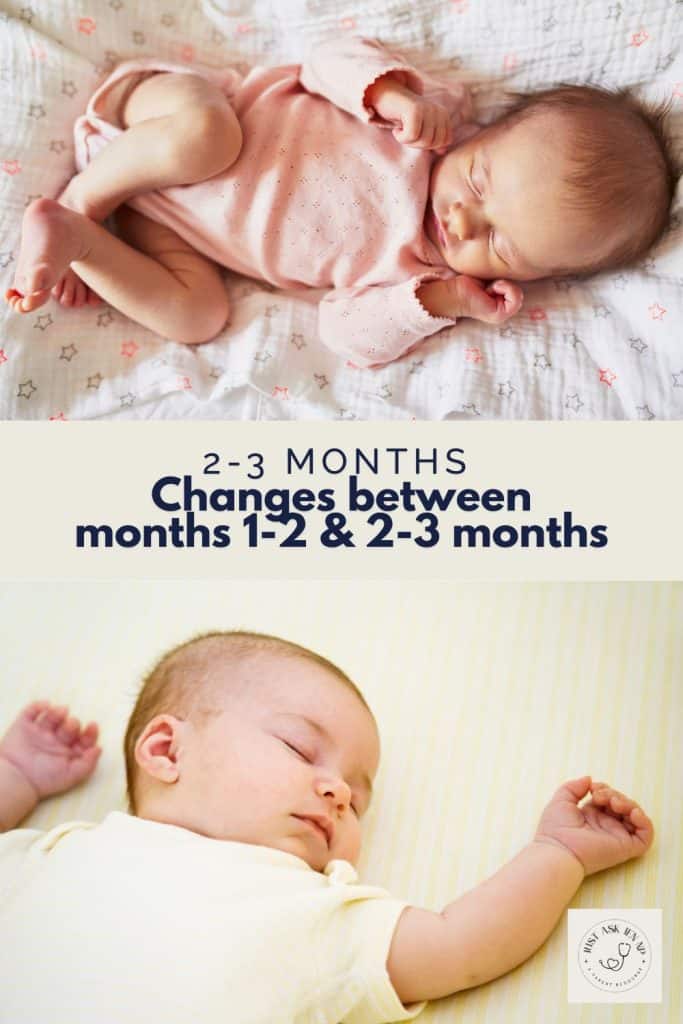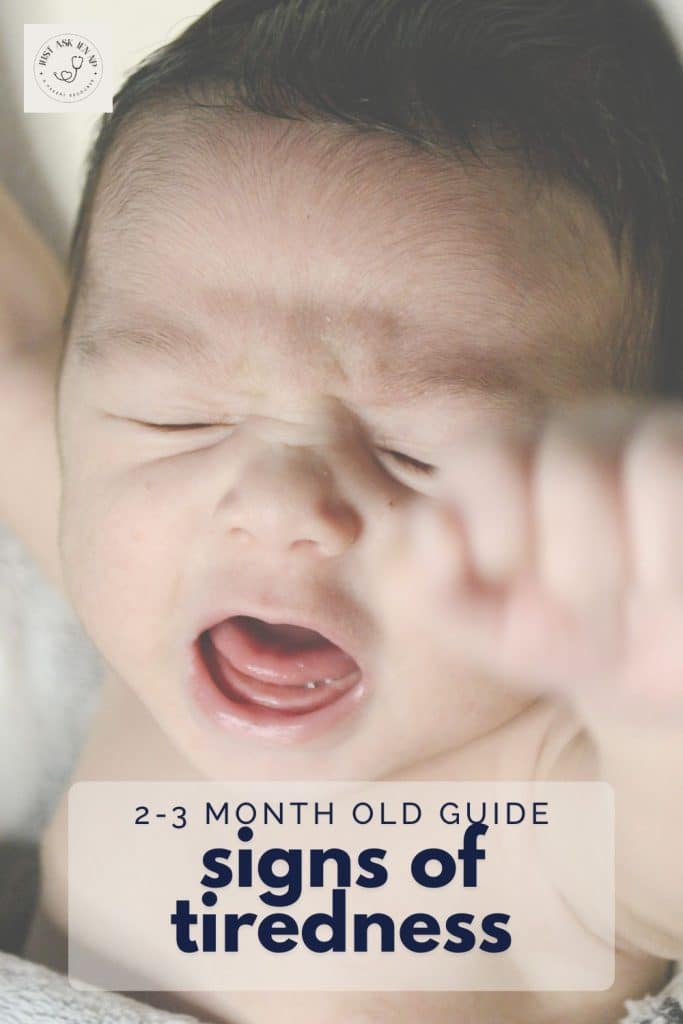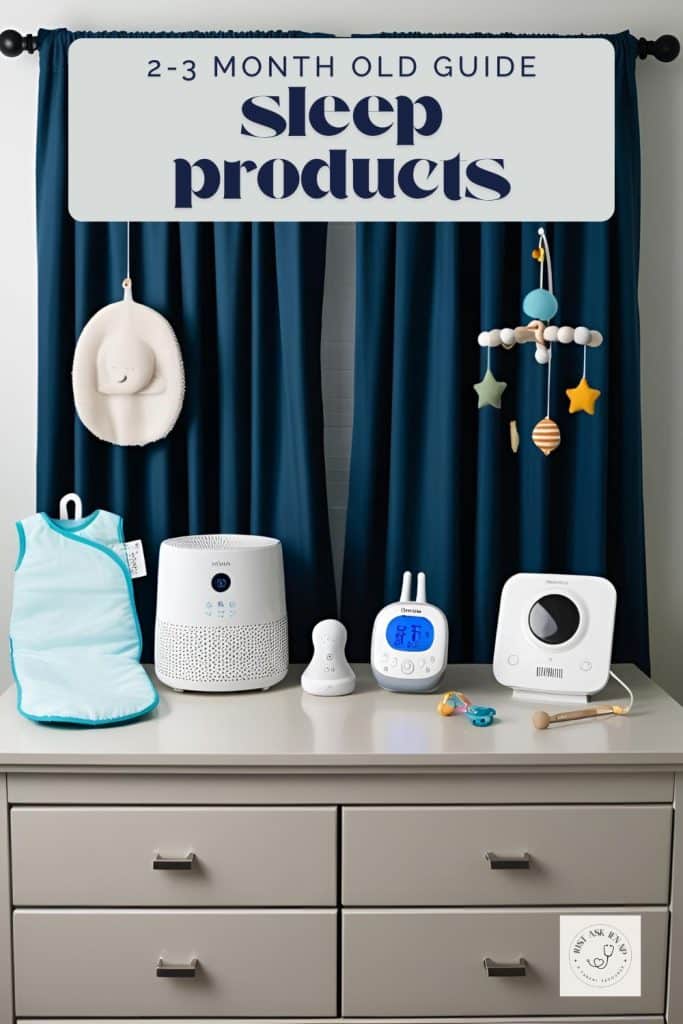2-3 Month Old Sleep: Developing Rhythms & Sleep Milestones

The 2-3 month old sleep development marks a significant transition in your baby’s sleep habits. Many parents find this stage brings both exciting progress and new challenges as sleep patterns begin to organize and your baby’s personality emerges more clearly.
If you missed the 1-2 month guide, check out this link.
If you’re ready to move to the 3-4 month guide, check out this link.
Sleep Development from 1-2 Months to 2-3 Months

Several important developments occur during months 2-3:
- Circadian rhythm establishment: Most babies now show clearer day/night differentiation
- Sleep consolidation: Night sleep begins organizing into longer stretches
- More mature sleep cycles: Sleep cycles extend to approximately 60-90 minutes
- Decreased total sleep: Average sleep decreases slightly to 14-16 hours per 24-hour period
- Social smiling and engagement: Increased social development may impact sleep patterns
- Beginning self-regulation: Some babies show emerging abilities to self-soothe
Normal Sleep Expectations for 2-3 Month Olds
Here’s what you can typically expect during this period:
- Night sleep stretches: Many babies achieve one longer stretch of 4-6 hours (though still with multiple night wakings)
- Awake windows: Typically 60-90 minutes between naps
- Daily naps: Usually 3-5 naps, becoming slightly more organized, averaging 30 minutes to 2 hours
- Bedtime: Often shifts earlier, with a “sweet spot” between 7-8:30pm for many babies
- Morning wake time: More consistent morning wake time, typically between 6-8am
- Self-soothing attempts: Some babies begin finding fingers/thumbs or other self-calming techniques
Signs Your 2-3 Month Old Needs More Sleep

Watch for these more distinct tired signals at this age:
- Decreased engagement in play or interaction
- More deliberate eye rubbing
- Arching back or tensing body
- Increased fussiness and decreased ability to be soothed
- Very brief moments of hyperactivity followed by exhaustion
- Faster breathing or slightly raised eyebrows
When to Worry About Too Much 2-3 Month Old Sleep
At 2-3 months, sleep concerns shift slightly:
- Baby regularly sleeps more than 16-17 hours daily and is difficult to wake
- Missing feeding cues (babies this age typically need 6-8 feedings in 24 hours)
- Notable decrease in alertness compared to previous weeks
- Limited periods of engagement during awake times
- Excessive daytime sleepiness interfering with developmental activities
Sleep Tracking in Months 2-3
At this age, tracking reveals more discernible patterns:
- Night sleep beginning to cluster in longer segments
- Naps organizing around consistent times (though not necessarily by the clock yet)
- Correlation between appropriate awake windows and sleep quality
- Emerging “sweet spot” bedtime when baby falls asleep most easily
- Sleep disruptions often linked to developmental milestones
Many parents notice the first true sleep patterns emerging during this period. If you’ve been tracking sleep, review your data to identify your baby’s natural rhythms.
Supporting Healthy Sleep at 2-3 Months

Build on earlier sleep foundations with these age-appropriate approaches:
DO:
- Establish a consistent bedtime routine: Slightly expand to 15-20 minutes with predictable elements like a brief book, gentle massage, sleep sack, white noise, and feeding
- Practice appropriate awake windows: Watch for tired signs around 60-90 minutes of awake time
- Create sleep-conducive environment: Darkened room, white noise, and comfortable temperature (68-72°F)
- Offer practice with self-soothing: Brief opportunities to settle while drowsy but awake, with responsive support
- Begin predictable pre-sleep rituals: Consistent sleep phrases or songs that signal sleep time is approaching
AVOID:
- Overstimulation before sleep: Limit exciting play, screens, or excessive activities before naps/bedtime
- Inconsistent response to night wakings: Develop a consistent approach to night wakings to help baby learn expectations
- Keeping baby awake too long: Overtiredness at this age significantly impacts sleep quality
- Rushing to intervene: Give brief moments for self-settling before offering assistance
The 3-Month Sleep “Regression”

Around 12 weeks, many babies experience sleep disruption due to:
- Major cognitive and physical developmental leaps
- Increased awareness of surroundings and separation
- Beginning transition from newborn to more mature sleep patterns
- Possible “practice” of new motor skills during sleep
- Some babies transitioning from swaddle to arms-free sleep
This regression is usually temporary but can be challenging. Maintain consistency while acknowledging your baby’s changing needs.
When to Call Your Healthcare Provider
Contact your pediatric provider if:
- Your baby cannot be awakened easily
- Sleep patterns suddenly change dramatically
- You notice abnormal movements during sleep that concern you
- Your baby’s sleep disruption is accompanied by other symptoms like fever or notable behavior changes
- You have persistent concerns about your baby’s sleep or development
Sleep Products for 2-3 Month Olds

Consider these evidence-based sleep supports:
- Sleep sacks/wearable blankets: Especially important as many babies transition from swaddling
- White noise machine: Helps mask household sounds and promotes deeper sleep
- Blackout curtains: Particularly helpful for early morning and daytime naps
- Room thermometer: Maintaining optimal sleep temperature (68-72°F)
- Video monitor: Allows observation without disrupting emerging self-soothing
Final Thoughts
The 2-3 month period often brings the first real glimpse of sleep organization and the beginning of more predictable patterns. While most babies still wake multiple times at night, many families experience the first longer stretches of sleep during this 2-3 month old sleep period.
These emerging patterns are building important foundations for healthy sleep habits. Your consistency now helps your baby develop sleep associations that will serve them well in the coming months.
Disclaimer: This information is intended for educational purposes only and is not a substitute for personalized medical advice. Always consult with your pediatric healthcare provider regarding your specific situation and concerns.










